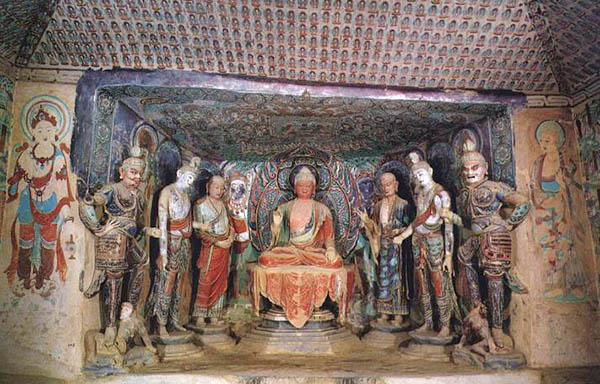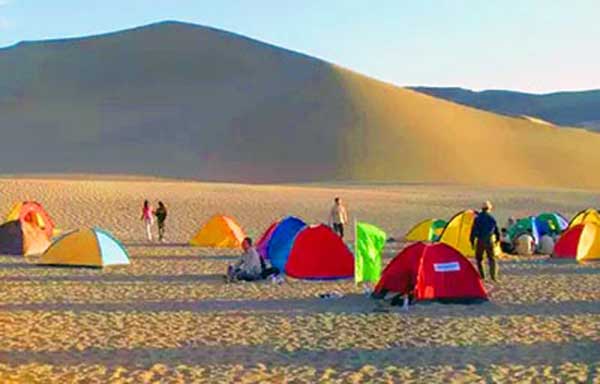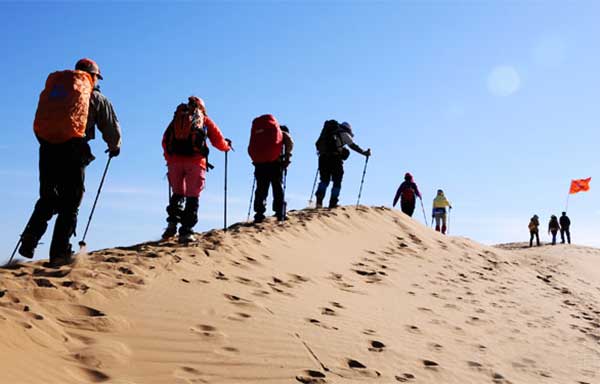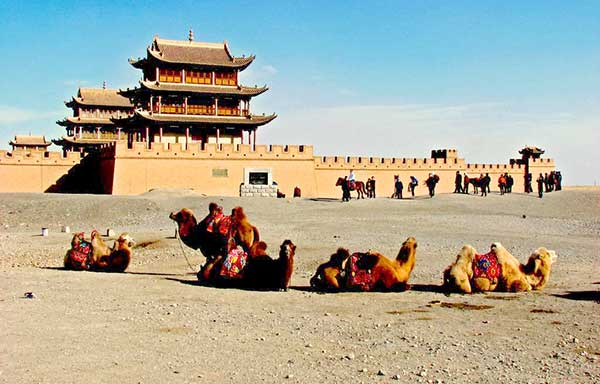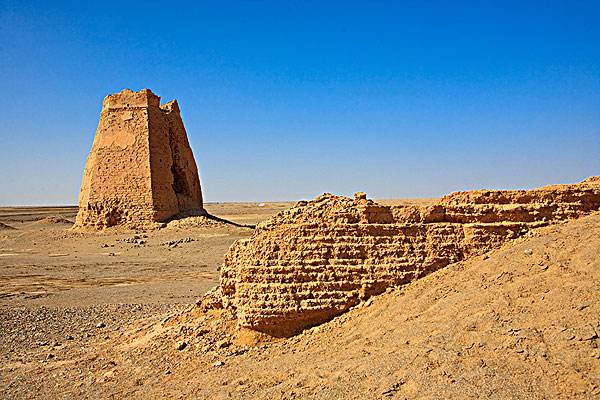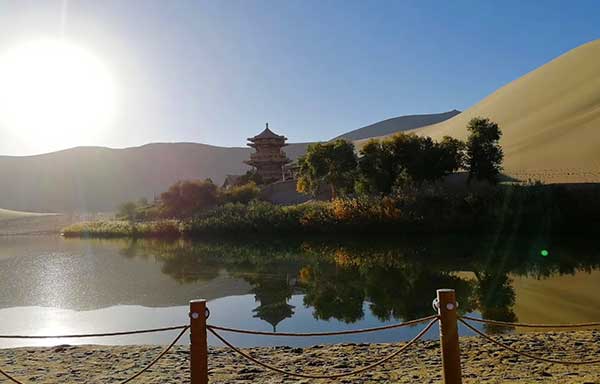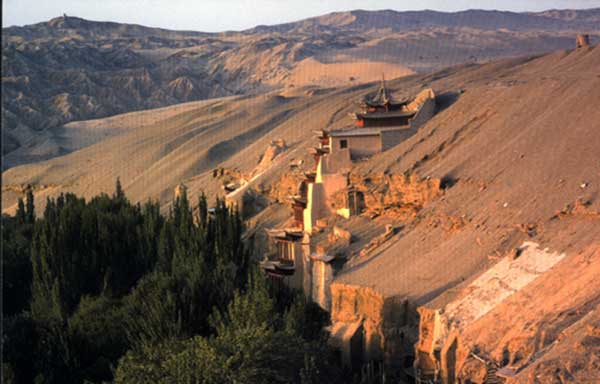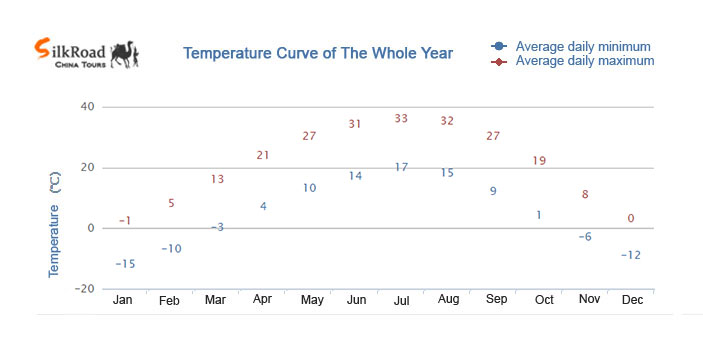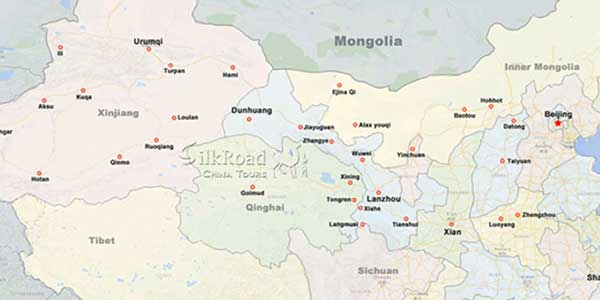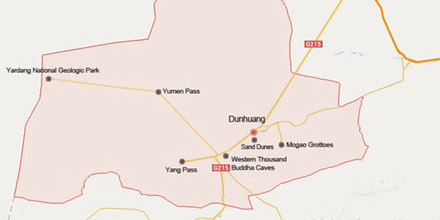Dunhuang Tours
In the long river of history, Dunhuang holds a prominent position.
The term "Dunhuang" is interpreted by Eastern Han scholar Ying Shao as follows: "Dun, meaning grand; Huang, meaning flourishing." It conveys the meaning of grandeur and brilliance, embodying the wish for prosperity and flourishing.In the era when navigation technology was limited, the Hexi Corridor became the throat passage connecting the Central Plains and the Western Regions. Among them, Dunhuang, located at the far west end of the "corridor," held the most critical position, controlling the key point of the Silk Road and being the "throat of the throat."
"Envoys could be seen on the roads, and merchants never ceased on the trails." Dunhuang thus became a distribution center for goods from the East and the West, where merchants and envoys traveling from the East and the West had to stop, gradually making it an "international trade city."
In the beautiful city of Dunhuang lies the world's oldest, largest, most richly endowed, and best-preserved artistic treasure trove: the Mogao Caves of Dunhuang, also known as "The Art Gallery of the Great Desert."
Located 25 kilometers southeast of Dunhuang city at the eastern foot of the Mingsha Mountain, the cave complex stretches over 1600 meters in length. After a millennium of construction, it now boasts 735 existing caves, 45,000 square meters of murals, and over 2400 painted sculptures. This grotto is a cultural heritage that uniquely combines cave architecture, painted sculptures, and murals, holding immense historical, artistic, and scientific value.
The Mogao Caves represent the largest, longest-lasting, most comprehensive, best-preserved, and most exquisitely artistic Buddhist cave temple site in the world. They are the epitome of the multicultural exchange and mutual enlightenment of civilizations along the ancient Silk Road. In 1987, the Mogao Caves were inscribed on the UNESCO World Heritage List.
The Yumen Pass and Yangguan Pass established in Dunhuang also became some of China's earliest "customs." "Why blame the willows with a Qiang flute, when the spring breeze never crosses the Yumen Pass" and "I advise you to drink another cup of wine, for beyond Yangguan Pass there are no old friends"... They have witnessed the prosperity of trade, as well as the grandeur and vastness of the frontier and the setting sun over the long river, becoming cultural landmarks that have spanned a thousand years.
A journey to Dunhuang is a spiritual cleansing, a pursuit of history and culture. Each attraction here is like a thick volume, awaiting our exploration and interpretation. They not only allow us to appreciate the wonders of nature's craftsmanship but also make us feel the greatness and immortality of human civilization.
Treat yourself to a well-deserved mini-vacation to discover the vibrant hues hidden within the sands of Dunhuang, to savor the unique flavors encapsulated in Dunhuang's cuisine, and to experience the place that has captivated hearts time and time again.
Trust me, Dunhuang will leave you with unforgettable memories, making you often reminisce about this magical land throughout the long river of time.
Read More Tailor Made Tour
4 Days Dunhuang Art In-depth Tour
Dunhuang was at the hub of cultural exchanges between China and the West along the "Silk Road", th ...
Price : From *** USD
Dunhuang Classic Day Tour
Dunhuang used to be an important city along the ancient Silk Road, which directly led to the Western ...
Price : From 175 USD
3 Days Dunhuang Classical Bike Tour
Bike tour is a great way to explore the natural beauty of Dunhuang. Our tour is spent riding along t ...
Price : From 249 USD
2 Days Dunhuang Desert Camping Tour
This tour can give you more special experience outside the popular tourist attractions. You will hav ...
Price : From **** USD
5 Days Dunhuang Desert Hiking Tour
This tour designed for people who love Outdoor sport, would like to explore the desert near Dunhuan ...
Price : From **** USD
4 Days Dunhuang-Jiayuguan Essence Tour
This tour will include the highlights in Dunhuang and Jiayuguan, is especially designed for the visi ...
Price : From **** USD
4 Days Dunhuang Explore Tour
What is the charm of Dunhuang? This tour will give you an answer! You can not only visit the Mogao G ...
Price : From **** USD
3 Days Dunhuang Elite Tour
This tour designed for visitors who only have time to stay one night in Dunhuang. During the time, y ...
Price : From **** USD
4 Days Dunhuang Highlight Tour
This tour designed especially for visitors who have strong interest in art and Buddhism. You can not ...
Price : From **** USD
Dunhuang Airport
Dunhuang Airport, officially known as Dunhuang Mogao International Airport, is approximately 12.7 kilometers from the city center of Dunhuang and about 15 kilometers from the Mogao Caves. The airport is a 4D-level international regional airport and also a first-class aviation port open to the outside world.
Dunhuang Mogao International Airport was initially constructed in July 1982, and its Terminal 1 (T1) was put into operation in 1987. Subsequently, Terminal 2 (T2) was inaugurated on August 18, 2002, followed by Terminal 3 (T3) on August 31, 2016. On August 16, 2017, the airport's 3400-meter runway was put into use, changing the airfield's indicator rating to 4D. On March 10, 2020, the airport was officially renamed to Dunhuang Mogao International Airport.
Airport Shuttle Bus to the city : ¥30 Contact number: 0937-8866133, 400-730-0022


Please note: the time and schedule are subject to change, please check civil aviation ticketing system.
Dunhuang Train Station
Dunhuang Train Station is located 10km from the city, which was built in 2006. There are several trains leave for other important cities each day. K369 Dunhuang – Xian (09:30-09:27), K9667 Dunhuang – Lanzhou (19:02-10:03), Y669 Dunhuang – Lanzhou (20:10-07:23). The trains terminate in Dunhuang are K367 Xian – Dunhuang (10:03-09:21), K9667 Lanzhou – Dunhuang (17:17-08:14), Y667 Lanzhou – Dunhuang (18:01-06:37) If you are from other cities you probably need to take train to Liuyuan (a small town 120 km from Dunhuang) and then take a bus to Dunhuang.
The Climate of Dunhuang
Dunhuang has a temperate arid climate, which is dry and arid all year long. The average annual rainfall in the area is only 39.9mm, but the evaporation is 2486 mm. The weather change dramatically with the four seasons. Spring in Dunhung is usually windy and sometimes has strong sandstorm. Summer is hot and dry. Autumn is best of the year, the air is cool and comfortable. Winter can be freezing cold with little snow. The annual average temperature is 9.4 ℃, the highest monthly average temperature is 24.9 ℃ in July, the monthly average minimum temperature is -9.3 ℃ in January.
Dunhuang Sun rise / Sunset time in 2024
| Month | Sun rise | Sunset | Sun rise | Sunset |
|---|---|---|---|---|
| Jan/Feb | 09:02 | 18:39 | 08:35 | 19:16 |
| Mar/Apr | 07:53 | 19:49 | 07:02 | 20:20 |
| May/Jun | 06:26 | 20:50 | 06:11 | 21:13 |
| Jul/Aug | 06:25 | 21:10 | 06:53 | 20:38 |
| Sep/Oct | 07:23 | 19:50 | 07:52 | 19:02 |
| Nov/Dec | 08:27 | 18:24 | 08:57 | 18:16 |
Local Cuisines in Dunhuang
Dunhuang belongs to arid desert climate. which is close to Qilian Mountain, the Dang river, Daquan river and Shule river originated from Qilian Mountain all run to Dunhuang and supplied with it abundant underground water.
Dunhuang is a typical oasis agricultural area. It has developed agriculture and animal husbandry, where once inhabited by multi-ethnic people whose diet custom was more or less left behind.
Dunhuang food revolves around wheat flour noodles as the main staple of the local diet. Noodles are served with lamb, chicken, or beef. On the other hand, Dunhuang Rang Pizi has long been one of the most popular dishes in the city. These noodles are actually made from pea flour and are clear, white, cool and slippery. The noodles are seasoned with hot peppers for a cool, yet spicy feel that is just perfect for desert weather
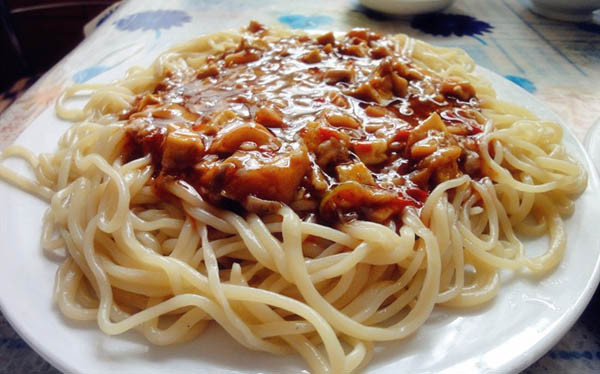
Dunhuang Yellow Hand-pulled Noodle
Some say that from a distance, Dunhuang yellow noodles (Huangmian) resemble threads of gold. While this is somewhat of an exaggeration, these noodles are by no means simple to make. Only the expert chef can properly pull the heavy dough into noodles. The fine thread-like noodles are then boiled in water until they float. However, the noodles are typically eaten cold or at room temperature. Yellow noodles are often eaten with other dishes as a staple (like rice in other parts of China).
On certain murals and frescoes in the Mogao Grottoes, there are vivid portrayals of people making yellow noodles. They're convincing proofs of the long history and popularity of Dunhuang Yellow Noodles.
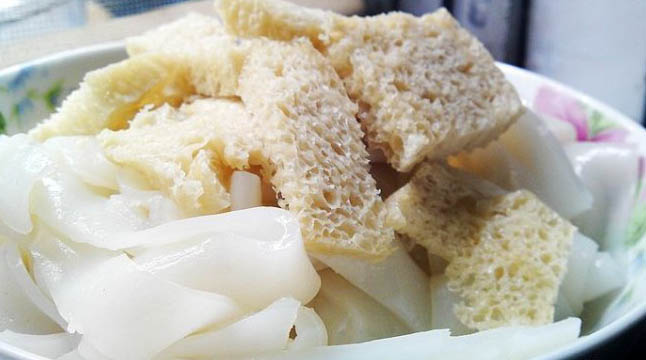
Cold Noodle - Niang Pi Zi
Dunhuang Cold Noodle is the most representative snack is Dunhuang, and it is really a must-have along your Dunhuang travel. Dunhuang cold noodle is featured with its unique making method and special local flavor. Served with other seasons like vinegar, salt, garlic, sesame oil, cucumber and chili oil, the cold noodle tastes much more delicious.
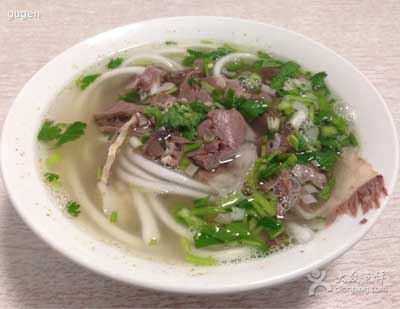
Mutton Soup
Mutton soup is traditional local food in Dunhuang. Usually plump and sturdy local wethers were slaughtered and cut into large pieces. Then cook in pot with water. When the water boils clean the froth on the surface and put some salt in. when the meat is ready take it out and cut meat off from bones. Then put bones back pot to cook soup. When eating, add some water in the soup and put ginger, pepper, cinnamon, chili, salt, turnip and potato noodles in. meat were sliced into thin pieces and put in the bowl, then scoop boiling soup into the bowl and add green onions and coriander. The mutton soup is good in color, flavor and taste, it’s also nutritious. In cold winter, a bowl of mutton soup will help to dispelling cold.
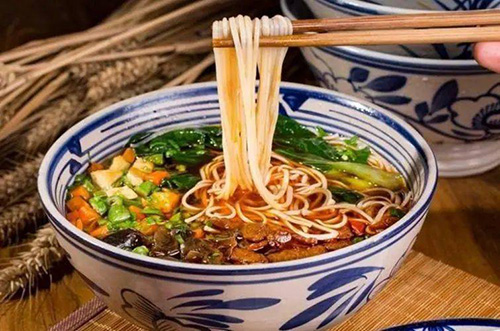
Dunhuang Saozi Noodles
Dunhuang Saozi Noodles is a traditional noodle dish that originates from Dunhuang, a historic city along the ancient Silk Road. This dish is a beloved staple in the local cuisine, reflecting the rich culinary heritage of the region. Dunhuang Saozi Noodles is more than just a meal; it is a culinary experience that offers a taste of the history and culture of Dunhuang. Whether you are a local or a visitor, this dish is a must-try for anyone looking to explore the rich flavors of the Silk Road.
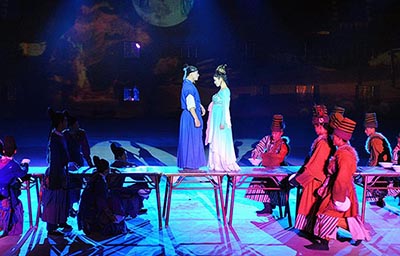
Dunhuang Celebration
"Dunhuang Celebration" focus on a legendary love story. Besides utilizing the scene of Singing Dunes, Crescent lake in the desert and glorious buildings from Han and Tang Dynasties in Dunhuang Villa, the show uses a series of frontier degree rotating seats, the new use of wall show, the naked eye 3D, holographic imaging and so on. The show is like a tunnel of time and space that brings the audience back to 2000 years ago to fully experience historical and cultural features of Dunhuang, an important town along the Silk Road. The performances are magnificent, majestic and fascinating...Read More
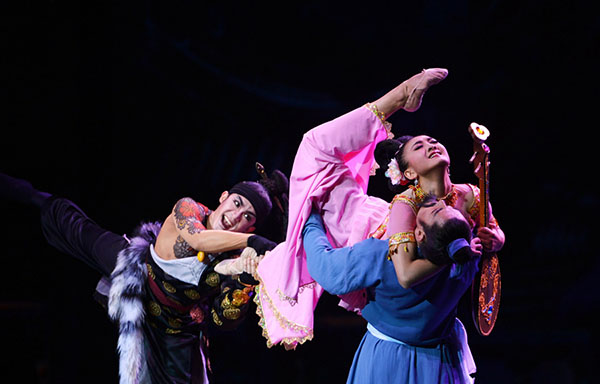
Silk Road flower rain
"Silk Road flower rain" is a large Chinese national dance drama created in 1979 by the Gansu Song and Dance Theater, which was based on the murals in Dunhuang Mogao Grottoes and derived from the essence of Chinese folk dance. It has initiated a new route for Chinese folk dance. The performance was praised by media as “alive Dunhuang murals and treat of beautifulness”. In the following years the performance was on stage throughout China and received unprecedented popularity. It was also staged in HongKang, North Korea, Japan, Italy, Thailand, France, etc and was deemed as a brilliant work of oriental art and classic folk dance of China in 20th century.
Why Choose Us?
We are the top Silk Road tour operator based in Dunhuang, China. We focus on providing well designed Silk Road China Tours with resonable price and thoughtful service.
- Easy & carefree booking
- The best value
- Great travel experience
- Locally operated
Testimonials
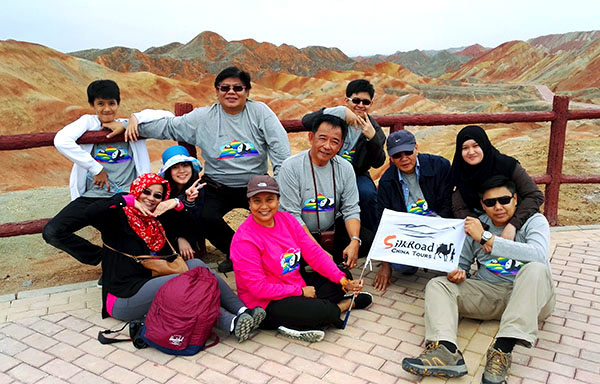
Your precious comments will be a powerful motivator for us to do better and better.
Tailor-made Tours

Your final trip plan will be 100% tailored to your needs, incl. itinerary, activities, hotel, meal plan etc.
Join-in Tours
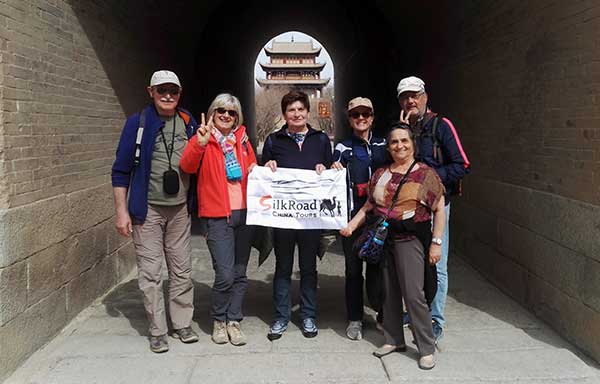
Find you travel companions to share the joys, memories, and expense of the trip.
Relevant blogs
-
What is the connection between "dragons" and "snakes" in the murals of the Dunhuang Grottoes?
-
Endangered Przewalski's Horses Spotted at Dunhuang Yumen Pass - a UNESCO World Heritage Site
-
Dunhuang Saozi Noodles
-
The Fourth Dunhuang Cultural Tourism Supplier Conference in Northwest China Opens
-
"Flying Over the Sky" Dunhuang Art Exhibition Opens in Auckland, New Zealand
-
During the Spring Festival holiday, Dunhuang City achieved a tourism revenue of 314.6 million yuan.











